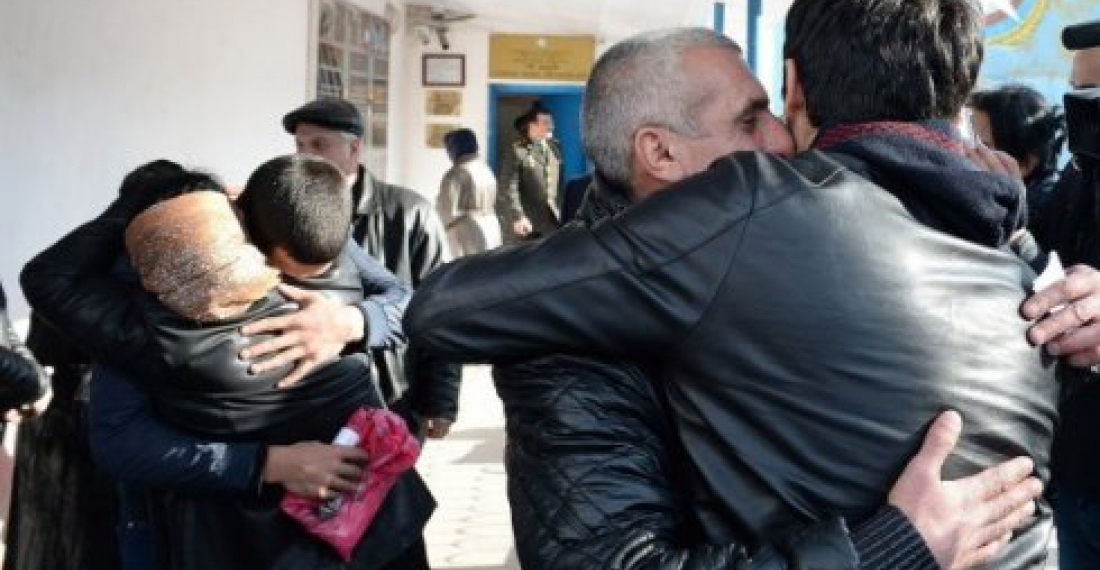Azerbaijani President Ilham Aliyev on Saturday (16 March) signed a decree pardoning a number of convicted persons. According to the order, a total of 431 people were pardoned. Among them, 399 people were released from serving the remainder of the sentence, whilst others had their sentence reduced.
The presidential pardon coincides with the Novruz Holiday, one of the most important yearly festivals in Azerbaijan. Whilst it is usual for the president to pardon a number of people on the occasion of the holiday, this year the list is more significant because it includes dozens of people who are considered to be opposition activists, most of who had been designated by international human rights organisations as political prisoners or prisoners of consciensce. The influential website Haqqin.az said that 50 "opposition" activists were included in the amnesty. These include activists of the Nida Youth movement, Gias Ibragimov, Bayram Mammadov, Ilkin Rustamzade, officials of the Popular Front Party of Azerbaijan Gezyal Bayramli and Fuad Gahramanly. Also released was the former Minister of Health, Ali Insanov who in 2005 was jailed after being implicated in an attempted coup. Also released were a number of people from the village of Nardaran, known for its religious activism and as a bastion of religious opposition to the Baku authorities.
In an editorial, published on Sunday (17 March), Haqqin.az says that the presidential pardon is not a sign of weakness. "Far from it, power is stronger and more effective than ever. However, from the very first days of the new year 2019, Ilham Aliyev announced a new course on economic liberalisation. A new generation of "young reformers" has come to the government and presidential administration, an active fight has begun against corruption, nepotism, and monopoly over profitable spheres of the economy." The website reproaches those foreign critics of the government who in the past have failed to understand that Azerbaijan needed firm government. "In countries such as Azerbaijan, the government must necessarily be resolute, tough and respond to the challenges of the time. But there is a very thin, almost invisible line between decisiveness and repressiveness. The Azerbaijani authorities are not repressive, but they are decisive and effective. If in countries such as Azerbaijan, the effectiveness of power begins to weaken, it will lead, if not to the decline of the entire political system, but at least to a crisis of the system of power relations."
Haqqin.az, editorial, penned under the name of its owner Eynulla Fattulayev, concludes that the presidential pardon "confirms once again how confident and strong the Azerbaijani authorities are in front of real and perceived threats. The government calls on the opposition to an honest and civilized struggle for power. And this path is only through the ballot boxes." The editorial concludes that "power can be shifted only by the number of ballots, and not by the number of barricades threatening stability and order".
Commonspace.eu political editor said in a comment that "with the stroke of a pen president Ilham Aliyev has changed the dynamic of Azerbaijani politics. The pardon of so many of the government's opponents - ranging from youth activists, to religious zealots to ambitious oligarchs - is a resolute, some may even say that from a government perspective it is a risky measure. In essence this is an olive branch to the government's critics, inside and outside the country, domestic and international. Its significance should not be understated. President Aliyev has in the last weeks been preparing the country for major changes. This presidential pardon may well be the opening shot of more to come".
source: commonspace.eu
photo: There were emotional scenes as pardoned prisoners met relatives in Baku on Sunday (17 March) following a presidential pardon coinciding with the Novruz Holiday. (picture courtesy of Haqqin.az, Baku)







